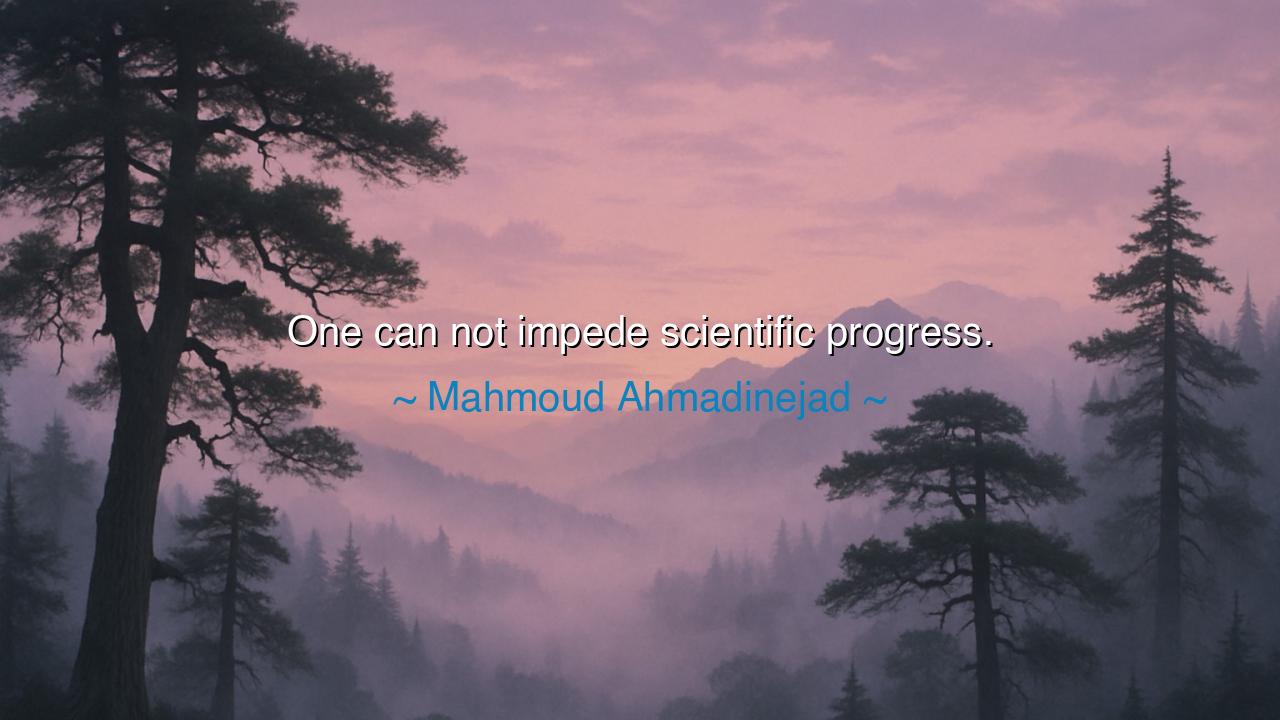
One can not impede scientific progress.






"One can not impede scientific progress." These words, spoken by Mahmoud Ahmadinejad, hold a timeless truth that resonates across the ages. Science, as the pursuit of understanding and knowledge, is an unstoppable force, akin to the flow of a great river that carves through mountains, shaping the landscape of human existence. In his statement, Ahmadinejad acknowledges the essential nature of scientific progress, a force that moves forward regardless of the obstacles placed in its path. Whether through the resistance of political regimes, cultural norms, or even the skepticism of the uninitiated, science continues its march toward enlightenment, uncovering the mysteries of the world and reshaping the very fabric of human civilization.
In the ancient world, knowledge was revered as the key to understanding both the earthly and the divine. The Greeks, such as Plato and Aristotle, established the foundations for what we now call scientific thought—the idea that reason and observation could lead humanity to deeper truths about the universe. Yet, even in their time, there were forces that sought to impede the progress of knowledge. Socrates, for example, was sentenced to death not because of his wisdom, but because his questions disturbed the established order of thought. His method of relentless questioning threatened the status quo, challenging the prevailing beliefs and exposing the limitations of accepted knowledge. But Socrates understood, as Ahmadinejad’s words imply, that science—or the search for truth—cannot be stopped, no matter how fiercely it is opposed.
The Renaissance, that great awakening of intellectual and artistic flourishing, was another period where the relentless advance of science could not be stifled. Galileo, with his revolutionary work in astronomy, faced severe opposition from the Church and its influence over the intellectual landscape of Europe. Yet, despite the persecution he faced, Galileo persisted, turning his telescope toward the heavens, observing the moons of Jupiter and the phases of Venus, discoveries that would forever alter the course of human understanding. Galileo’s story is a testament to the unstoppable nature of scientific progress, for even in the face of opposition, his work not only survived but laid the foundations for the scientific revolution that would follow.
Similarly, consider the development of vaccines and the eradication of diseases—another example of scientific progress that could not be impeded. The work of Edward Jenner in developing the smallpox vaccine, and the subsequent global efforts to eradicate the disease, changed the course of human history. There were, of course, those who resisted these new scientific discoveries, whether out of ignorance or fear. Yet the progress made in medicine has continued to advance, saving countless lives, preventing the spread of diseases, and improving the quality of life for people around the world. No matter how fiercely some may oppose it, the power of science to heal, to cure, and to improve life cannot be extinguished.
Ahmadinejad’s words also carry a deeper implication—that science is not a mere pursuit of knowledge for its own sake, but a force that shapes civilizations, that guides humanity toward a greater understanding of itself and its place in the cosmos. The Industrial Revolution and the advancement of technology in the last few centuries have transformed the world in ways that were once unimaginable. The advent of electricity, air travel, and computers—all of these are the fruits of scientific progress. While there are many who fear the consequences of such rapid advancement, science remains a force that cannot be slowed. The pursuit of knowledge propels humanity forward, often in ways that are beyond our control, but always with the potential for great benefit to society.
The lesson to be drawn from Ahmadinejad’s statement is this: science is not a force that can be held back. It is a natural and inevitable part of human curiosity, of our longing to understand the world and to improve our lives. Knowledge, once discovered, cannot be unlearned, and the progress it brings is unstoppable. Yet, with this great power comes great responsibility. As stewards of scientific progress, we must ensure that it is guided by ethics, wisdom, and a deep sense of moral responsibility. The question is not whether science will continue, but how we, as individuals and as societies, will choose to wield it. Will we use it to build and create, or to destroy and harm?
In your own life, reflect on the role of science in your journey. How do you contribute to the unfolding story of human knowledge? Whether in your career, your studies, or your everyday actions, consider how you can support the advancement of human understanding. Recognize that scientific progress is an unstoppable force, and that it is not only for the benefit of a few but for the betterment of all. Whether through education, innovation, or simply embracing curiosity, each of us has a part to play in shaping the future of science. Embrace the power of knowledge, and be mindful of how you contribute to the progress that will define the generations to come.






AAdministratorAdministrator
Welcome, honored guests. Please leave a comment, we will respond soon